Interviews
Interview with Mr. Vadym KHOLODENKO
1st Prizewinner of the Piano Section at the 4th SIMC
Interviewed by: KOHSAKA Haruka (Music writer)
interviewed : 20141004
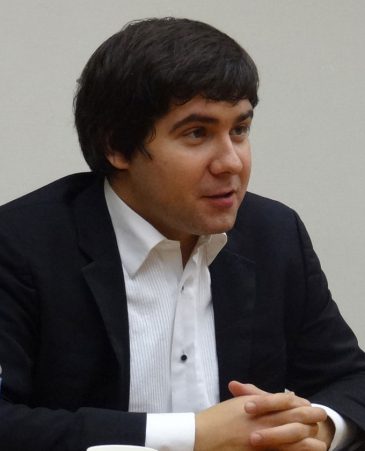
Pianist Vadym KHOLODENKO first visited Sendai in 2008. He performed with Ms. Alena BAEVA, who won the 1st prize in the Violin Section at the 3rd Sendai International Music Competition (SIMC) which was held in the previous year, in her concert, which was given as a supplementary prize. Then, he himself won the 1st prize in the Piano Section at the 4th SIMC. In June last year, he won the gold medal at the Van Cliburn International Piano Competition (in Texas, U.S.), and holding this magnificent title, he lives a busy life with his performing activities. This year he visited Sendai to perform at the Sendai Classical Music Festival 2014 for the first time since he won the Van Cliburn International Piano Competition.
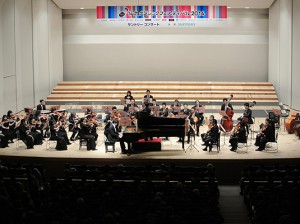
How was the reaction of the audience in Sendai, which you visited after such a long absence?
I was grateful that they always listen to my performances eagerly. Interestingly enough, I always feel the same connection between the audience and myself on stages where I perform in Japan. I remember that when I first performed in Sendai with Ms. BAEVA in 2008, I felt some special connection, and I always feel this.
I guess you came into contact with your fans in Sendai at the autographing session after the concert. Did anyone say anything about your victory at the Van Cliburn International Piano Competition?
No, no one. [laughs] When I come to Sendai, I myself only want to be the “first-prize winner at the Competition in Sendai.”
When you perform in a place like Sendai where you know that the audience is waiting in anticipation of your performance, how do you feel on the stage?
I feel a strong responsibility. They open up their mind, so I must do my best and give a performance that allows me to connect with them. The music passes from my heart and hands to the piano, and then is transformed into sound and finally delivered to the audience.
For example, even on a big stage like at the Van Cliburn International Piano Competition, I didn’t get nervous because the audience in Texas didn’t know me. On the other hand, because Sendai is a special city for me, I feel tense when I perform here.
Among your memories during the Competition in Sendai, is there anything that sticks out in your mind?
Yes, the great relationships between the performers and the Secretary staff, tuners, etc. You may think it’s a small thing, but it is big for me in allowing me to concentrate on the music. Thanks to these relationships, I didn’t feel any pressure during the Competition. The perfect running of the Competition really helped me to perform well.
In addition, my host family the Sumis gave me a boost from the beginning. Though they were not very good at English, they always cheered me on saying “Go for it! Do your best!” Moreover, they came to hear my performance, gave my daughter a present, and supported me throughout the Competition.
Come to think about it, you said that it was immediately before your first child was born that you won the 1st prize at the Competition in Sendai. And at the time of the Van Cliburn International Piano Competition, you said that your child would turn three soon and had begun prattling…
Yes. To tell the truth, at the time of the Van Cliburn International Piano Competition, my second child was born. So you want to ask me if I won’t have any more children because I won’t participate in any more competitions after this? [laughs]
No. [laughs] At that time, you said that when your child began prattling, you discovered that Mozart’s music has a quality similar to a child’s prattling, as well as its sophistication—that was very striking to me. As your children have grown older, have you had any other musical discoveries?
My children have certainly had an impact on my music. But I also think that maybe my music has changed because I become wiser with age.
When I told that story to Ms. UEHARA Ayako, who also studies under Prof. (Ms.) Vera GORNOSTAEVA and has three children, she laughed saying that Mozart is not as simple as children’s prattling.
That’s true, of course. I’m not trying to say that Mozart’s music is as simple as children’s prattling. In his music, sometimes white turns to black in just two seconds, in the blink of an eye. It’s wonderful and very deep music.
Be that as it may, I think that women can understand Mozart more easily. Because men can talk with and take care of children, but cannot give birth to a child. It’s a fact that women know more about children.
By the way, in which aspects do you feel the difference between SIMC and other competitions?
Because SIMC is so special for me, it is difficult to give an objective opinion, but…. Even before I participated in SIMC, I had already won the first prize at some competitions. But at SIMC, I won the first prize at a famous competition for the first time. In other words, the Competition in Sendai is the opportunity that proved my talent for the first time. Although the results are not everything, it is an important event after all, in which you can win first prize and have your efforts recognized.
Certainly, I then won the gold medal at the major competition, the Van Cliburn International Piano Competition, which enabled me to perform at hundreds of concerts. Even so, I think that winning at the Competition in Sendai has been the most valuable event for my career.
One other thing that I feel special at concerts not only in Sendai but in other parts in Japan is the connection between people. On the other hand, in the United States, I think the commercial sense is very strong.
For example, I will perform Bach’s “Art of Fugue” in Tokyo during my stay in Japan this time. In the U.S., it is difficult to give such a concert that does not attract a large audience, but in Japan I have the privilege of performing programs in which I am interested at small concerts. I am most grateful to the organizers who help me with interest.
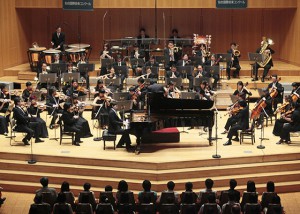
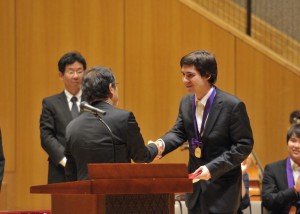
I imagine you must be busy with your performing activities. What kinds of activities are you going to perform in the future?
I was too busy last season. From the next season, I will receive management services from a new company in London. They understand what I want to do, so I think that I will be able to control the number of concerts and perform mainly at concerts with interesting programs and chamber music. I want to do performing activities giving consideration to the balance between attracting an audience and doing what I want to do.
By the way, I sometimes hear people say that with regard to competitions, it’s the taking part that counts, so you don’t need to worry about the results…
Yes, I have also said that. [laughs]
But what’s the reality? Competition results are important for pianists, and if you are not highly evaluated, you would feel bad, wouldn’t you?
Yes, that’s a bother for me. [laughs]
As you do not always get the results you expect from the judges, how do you get over such difficult experiences?
For young pianists who have yet to experience fame, I think that one way is to consider competitions as a tool to carve your path. I think that competitions are neither bad nor good. Nonetheless, you can certainly become tough by experiencing competitions. Your nerves will become as strong as steel. Maybe a competition is something like training in the army. Though it’s an environment in which everyone must participate, you can certainly become strong by spending time in it.
Moreover, I think that competitions also provide you with the opportunity to make your performance heard by someone who will support your future activities, including good managers. Some people say that competitions ruin musicians, but I think that out of line. If contestants have a strong will and are smart, their art will never be ruined whatever happens at competitions. All you have to do is practice, learn and continue your efforts without losing sight of your music. Even if you are ruined nonetheless, competitions are never bad.
Finally, please give some advice to players who are going to participate in the Competition in Sendai.
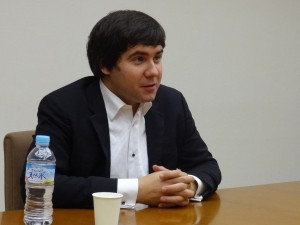
I envy you because you will have a similar experience to mine from now on. [laughs] The jury members of SIMC are excellent, and the Competition maintains a reputation for fair judgment. Moreover, even though such a long time has passed since I participated in the Competition, I was invited to Sendai this time. Anyway, I think it’s a great thing.
I also have something to tell people who have a difficult time getting good results at competitions. I’m not saying this because I finally happened to succeed in the competition, but if you are destined to be active on stage, a path toward success will surely be opened for you. A path toward success can be opened by your own motivation. If you continue to make 101% effort, no judge can block your path.
Good luck!


